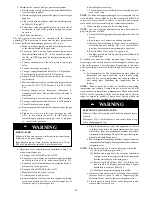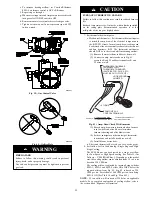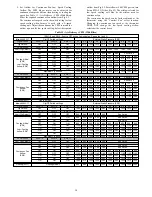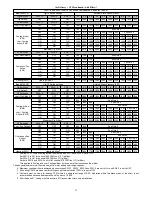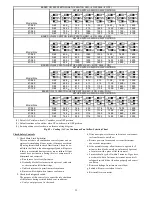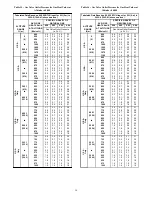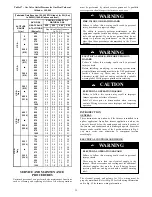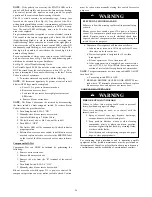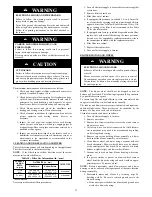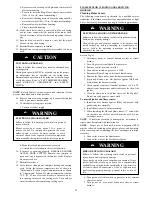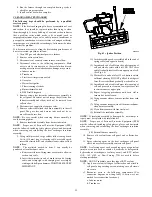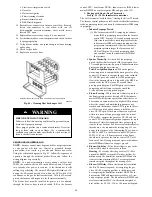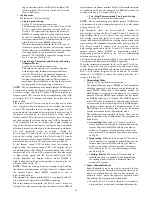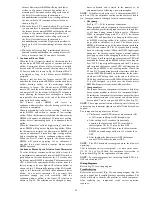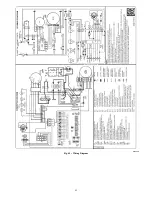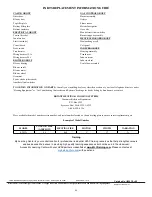
42
furnace blower motor BLWM will drop the blower
airflow to 65 percent of low--cooling airflow for a
maximum of 10 minutes each cooling cycle or until
the R--to--G circuit closes or the demand for
dehumidification is satisfied. Low--cooling airflow is
the true on--board CF (continuous fan) selection as
shown in Fig. 42.
b. When the R--to--Y/Y2 circuit is closed, R--to--G circuit
is open, and there is a demand for dehumidification,
the furnace blower motor BLWM will drop the blower
airflow to 65 percent of high--cooling airflow for a
maximum of 10 minutes each cooling cycle or until
the R--to--G circuit closes or the demand for
dehumidification is satisfied. High--cooling airflow is
based on the A/C (air conditioning) selection shown in
Fig. 42.
c. When the “call for cooling” is satisfied and there is a
demand for dehumidification, the cooling blower--off
delay is decreased from 90 seconds to 5 seconds.
5.
Continuous Blower Mode
When the R--to--G circuit is closed by the thermostat, the
blower motor BLWM will operate at continuous blower
airflow. Continuous blower airflow selection is initially
based on the CF (continuous fan) selection shown in Fig.
42. Factory default is shown in Fig. 42. Terminal EAC--1
is energized as long as the blower motor BLWM is
energized.
During a call for heat, the furnace control CPU will
transition the blower motor BLWM to continuous blower
airflow, heating airflow, or the mid--range airflow,
whichever is lowest. The blower motor BLWM will
remain ON until the main burners ignite then shut OFF
and remain OFF for the blower--ON delay (25 seconds in
heat), allowing the furnace heat exchangers to heat up
more quickly, then restarts at the end of the blower--ON
delay period at heating airflow.
The
blower
motor
BLWM
will
revert
to
continuous--blower airflow after the heating cycle blower
off--delay is completed.
When the thermostat “calls for low--cooling”, the blower
motor BLWM will switch to operate at low--cooling
airflow. When the thermostat is satisfied, the blower motor
BLWM will operate an additional 90 seconds at cooling
airflow before transitioning back to continuous--blower
airflow.
When the thermostat “calls for high--cooling”, the blower
motor BLWM will operate at high cooling airflow. When
the thermostat is satisfied, the blower motor BLWM will
operate an additional 90 seconds at high--cooling airflow
before transitioning back to continuous--blower airflow.
When the R--to--G circuit is opened, the blower motor
BLWM will continue operating for an additional 5
seconds, if no other function requires blower motor
BLWM operation.
Continuous Blower Speed Selection from Thermostat
To select different continuous--blower airflow from the
room thermostat, momentarily turn off the FAN switch or
push button on the room thermostat for 1--3 seconds after
the blower motor BLWM is operating. The furnace control
CPU will shift the continuous--blower airflow from the
factory setting to the next highest CF selection airflow as
shown in Fig. 42. Momentarily turning off the FAN switch
again at the thermostat will shift the continuous--blower
airflow up one more increment. If you repeat this
procedure enough you will eventually shift the
continuous--blower airflow to the lowest CF selection as
shown in Fig. 42. The selection can be changed as many
times as desired and is stored in the memory to be
automatically used following a power interruption.
NOTE
: If the blower--off delay is set to the maximum (SW1--7
and 8 are ON), the adjustable continuous--fan feature is locked
(i.e., fan speed cannot be changed from its current setting).
6.
Heat pump
See Fig. 27 -- 28 for thermostat connections.
When installed with a heat pump, the furnace control auto-
matically changes the timing sequence to avoid long blow-
er off times during demand defrost cycles. Whenever
W/W1 is energized along with Y1 or Y/Y2, the furnace
control CPU will transition to or bring on the blower mo-
tor BLWM at cooling airflow, heat airflow, or the mid--
range airflow, whichever is lowest. The blower motor
BLWM will remain on until the main burners ignite then
shut OFF and remain OFF for 25 seconds before coming
back on at heating airflow. When the W/W1 input signal
disappears, the furnace control begins a normal inducer
post--purge period while changing the blower airflow. If
Y/Y2 input is still energized the furnace control CPU will
transition the blower motor BLWM airflow to cooling air-
flow. If Y/Y2 input signal disappears and the Y1 input is
still energized the furnace control CPU will transition the
blower motor BLWM to low--cooling airflow. If both the
Y1 and Y/Y2 signals disappear at the same time, the blow-
er motor BLWM will remain on heat airflow for the select-
ed blower--OFF delay period. At the end of the blower--
OFF delay, the blower motor BLWM will shut OFF unless
G is still energized, in which case the blower motor
BLWM will operate at continuous blower airflow.
7.
Component test
The furnace features a component test system to help diag-
nose a system problem in the case of a component failure.
To initiate the component test procedure, ensure that there
are no thermostat inputs to the control and all time delays
have expired. Turn on setup switch SW1--6. (See Fig. 23)
NOTE
: The component test feature will not operate if the control
is receiving any thermostat signals or until all time delays have
expired.
The component test sequence is as follows:
a. The furnace control CPU turns the inducer motor ON
at 50% torque and keeps it ON through step c.
b. After waiting for 15 seconds of inducer only
operation, the furnace control CPU turns the hot
surface ignitor ON for 15 seconds, then OFF.
c. The furnace control CPU then turns the blower motor
BLWM on at mid--range airflow for 15 seconds, then
OFF.
d. After shutting the blower motor OFF the furnace
control CPU switches the inducer OFF
.
NOTE
: The EAC terminals are energized when the blower is
operating.
After the component test is completed, 1 or more status codes
(11, 25, 41 or 42) will flash. See component test section or
Service Label (Fig. 38) for explanation of status codes.
NOTE
: To repeat component test, turn setup switch SW1--6 to
OFF and then back ON.
Wiring Diagrams
Refer to Fig. 45 for wiring diagram.
Troubleshooting
Refer to the service label. (Fig. 38), and wiring diagram (Fig. 45)
can be a useful tool in isolating furnace operation problems. The
Guide will help to identify the problem or failed component.
After replacing any component, verify correct operation
sequence.

